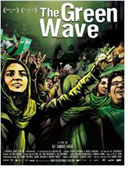

Opening 24 Feb 2011
Directed by:
Ali Samadi Ahadi
Writing credits:
Ali Samadi Ahadi
Principal actors:
Navíd Akhava, Payam Akhavan, Shirin Ebadi, Pegah Ferydoni, Mitra Khalatbari
Iranian director Ali Samadi Ahadi first showed his film at the 2010 Filmfest Hamburg. He is well loved for his comedy Salami Aleikum about Iranians who confront German culture in a small town after the son falls in love with an Amazonian blond. The Green Wave is no comedy; it is based on 60 hours of material or 1500 pages of blogs, emails, twitters, etc., which people wrote to each other about the tragic situation during the Iranian election in June 2009. At that time, just saying, “Where is my ballot?” could get a potential voter tossed into jail for an uncertain fate. More than once, commentators called the demonstrations and repercussions “not a wave, but a tidal wave.” Because names and faces must remain anonymous, artists interpreted the events in cartoons. The film reminded me of Persepolis by Marjane Satrapi, also about life in Iran, also in cartoon form.
At the festival premiere young Iranians provided green scarves for prominent guests to wear at the premiere in Cinemaxx. After the film, approximately 100 fans adjourned to Hamburg’s nearby Baseler Hof Hotel conference room for a discussion with director Ahadi, actress Pegah Ferydoni (appeared in Women Without Men, very successful at the 2009 Venice film festival), producer Jan Krüger, Omid Mouripour (member of the German Green political party and representative in the German Bundestag), and Benush Najibi (human rights activist in Hamburg). Most impressive was the number of young adult Iranians who spoke perfect German. They obviously came to Hamburg as children in the early ‘80s, with or without their parents, attended Hamburg schools and stayed, as did director Ahadi in 1985 at age 13. Naturally, the election in Iran is a pertinent topic, one which we cannot ignore. The film will help keep the news alive, although my favourite report on Iran is still Things I’ve Been Silent About by Azar Nafisi, who also wrote Reading Lolita in Tehran. (Becky Tan)